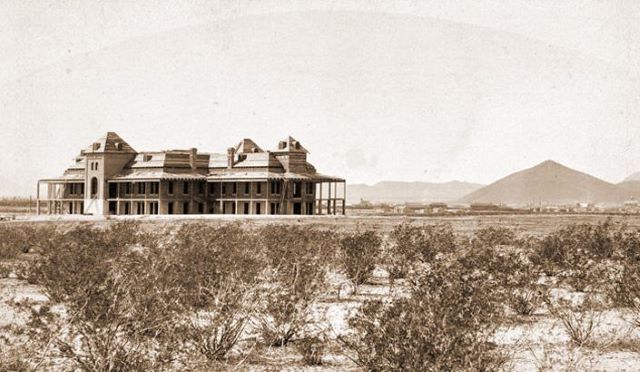
The University of Arizona has crafted a new statement that acknowledges the university’s home on the land and territories of Indigenous people. According to UArizona, the statement lays a foundation for meaningful partnerships and continued support for Native American students and communities.
The 1889 historical image of Old Main shows the first building erected on the University of Arizona campus. This image was taken during the final stages of construction. (Photo source the University of Arizona).
The full statement reads:
“We respectfully acknowledge the University of Arizona is on the land and territories of Indigenous peoples. Today, Arizona is home to 22 federally recognized tribes, with Tucson being home to the O’odham and the Yaqui. Committed to diversity and inclusion, the University strives to build sustainable relationships with sovereign Native Nations and Indigenous communities through education offerings, partnerships, and community service.”
The new land acknowledgment statement was crafted with the help of university leaders in consultation with leaders from local Indigenous communities.
“This is about us truly recognizing the sovereign nations and the people who were here before us and are still here today,” said Nathan Levi Esquerra, UArizona senior vice president for Native American advancement and tribal engagement. “It’s about us acknowledging and recognizing their culture and knowledge so we can understand our past as we move toward the future.”
Though some individual units across the university have used their own land statements, the new one marks the first official university-wide statement.
“This land acknowledgment is a milestone in our important ongoing discussions with the Tohono O’odham Nation, the Pascua Yaqui Tribe, and the 20 other federally recognized tribes in the state,” said University of Arizona President Robert C. Robbins. “It indicates our commitment to collaborating with the Native Nations and Indigenous communities.”
The concept for the university-wide statement came about four or five years ago when university leaders traveling abroad saw similar statements, said Karen Francis-Begay, UArizona assistant vice provost for Native American initiatives.
Institutions in countries such as Canada, Australia, and New Zealand have long recognized the homelands of Indigenous people, she added.
About two years ago, the university reached out to leaders of the Tohono O’odham Nation and the Pascua Yaqui Tribe to discuss the idea of a land acknowledgment. Both tribes were working on other priorities at the time, Francis-Begay said, and then the COVID-19 pandemic hit. The discussion recently resumed.
“The tribes really appreciated our consultation and that we were patient and heard them out about their connection to the land and their history,” Francis-Begay said, adding that input from Native American researchers and scholars at the university was also considered.
The U.S. Army Corps of Engineers has been tasked with…
Brown and Caldwell, a leading environmental engineering and construction firm,…
Humboldt State University, one of four campuses within the California…